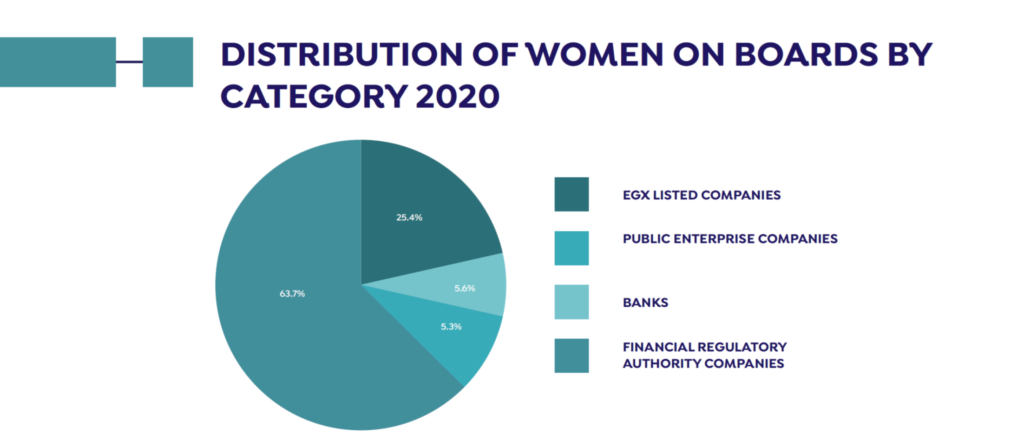In the recent years, the Egyptian government has put women at the core of the country’s sustainable development efforts. Aligned with Egypt’s Vision 2030, the National Strategy for the Empowerment of Egyptian Women was endorsed by the Egyptian President in 2017 and embodies four main pillars: political empowerment, economic empowerment, social empowerment and protection for all women. The strategy entails that women hold key leadership roles in both public enterprises and private companies seeking to reach a goal of 30 percent women representation by the year 2030.
The American University in Cairo (AUC)’s Egypt Women on Boards Observatory has just released its 2020 monitoring report showing a promising improvement in the women on boards indicator from 10 percent in 2019 to 13 percent in 2020.
The Observatory was founded in 2017 by a consortium initiated by the AUC School of Business and is recognized as a specialized observatory within the framework of the National Council for Women’s Egyptian Women Observatory. Besides its role in tracking progress and identifying gaps through its annual report, the observatory collaborates with various partners on capacity building, advocacy and on increasing the number of ‘board-ready’ women and qualified women leaders, as well as supporting companies to identify women board members through placements and nominations.
“We are seeing a historic change and political will from the Government of Egypt, actually by the highest level, [as indicated in] the President’s directive to make sure women are represented within the public sectors, as you heard almost two days ago,” states Maya Morsy, president of the Egyptian National Council for Women (NCW) in the virtual event launching the 2020 monitoring report on March 23, 2021.”The indicator of the women representation on boards is not just to have women represented. This is just a first step; we need women to be well represented with highest performance levels and be able to participate effectively within these boards,” elaborates Morsy.
“Today Women account for 70 percent of the global consumption which equals about $28 trillion in annual consumer spending worldwide, and in the language of return on investment the trickle-down effect of women’s greater economic engagement and leadership at home, community, and in the country is immense,” says Christine Arab, UN Women country representative in Egypt, encouraging graduates of the Corporate Directors Certification Program (CDCP) that the Observatory implements in collaboration with UN Women, NCW and is supported by the Swedish International Cooperation Agency (SIDA), to act as mentors to younger Arab women until they reach more senior levels. She believes that mentoring young women in order to understand their key role in contributing and keeping a gender equal environment, as well as reducing gender specific barriers to women entering and remaining in the workforce, is one of the single most important investments Egypt can make to advance its vision of economic growth.
Despite variations across the different categories of companies in the report, the results of the 2020 monitoring report show an overall positive performance of female representation on boards where 19 percent of FRA companies, 17 percent of public enterprise companies, 9 percent of banks and 8 percent of listed companies have boards that are at least 30 percent women.
When it comes to progress in the magnitude of women representation, EGX listed companies marked an increase from 10.1 percent to 11.2 percent between 2019 and 2020. The public enterprise sector reached 8.7 percent in 2020 compared to 6.1 percent in 2019. The FRA companies have significantly improved on the percentage of women on boards reaching 14.8 percent in 2020 compared to 11.2 percent in 2019. The banking sector has faced a slight decline in female representation on boards, dropping from 14.8 percent in 2019 to 13.7 percent in 2020.

Snapshot from the Egypt Women on Boards 2020 monitoring report
Ghada Howaidy, founder of the Egypt Women on Boards Observatory and associate dean for executive education and external relations at the AUC School of Business recognized the remarkable achievements, and emphasized that there is still much work to be done. 43 percent of EGX listed companies, 21 percent of banks, 72 percent of public enterprises and 47 percent of FRA companies still have zero women on boards.
“We believe that having more women on boards has [a] positive impact operationally and financially on the listed companies,” says FRA’s chairman Mohamed Omran. In line with the national women empowerment strategy, Egypt’s Financial Regulatory Authority (FRA) issued last year a declaration to all companies under its supervision to include at least one woman on their boards by the end of the year 2020.
Per-Axel Friellngsdorf, Charge d’affaires at the Embassy of Sweden in Cairo, that supports the development of the annual monitoring report, believes that there is a limit to what governments alone can do, and that real change is brought about by brave individuals.

Snapshot from the Egypt Women on Boards Observatory 2020 monitoring report
According to the 2020 report 95 qualified women – down from 113 last year- are needed to join the boards of banks, EGX listed companies, public enterprise companies and the Financial Regulatory Authority companies every year to reach the target of 30 percent women on boards by 2030, which could be an achievable target taking into consideration the political will and the public-private collaboration aiming at reaching this goal.
Access the full Egypt Women on Boards 2020 monitoring report here.
Access the report highlights here.









